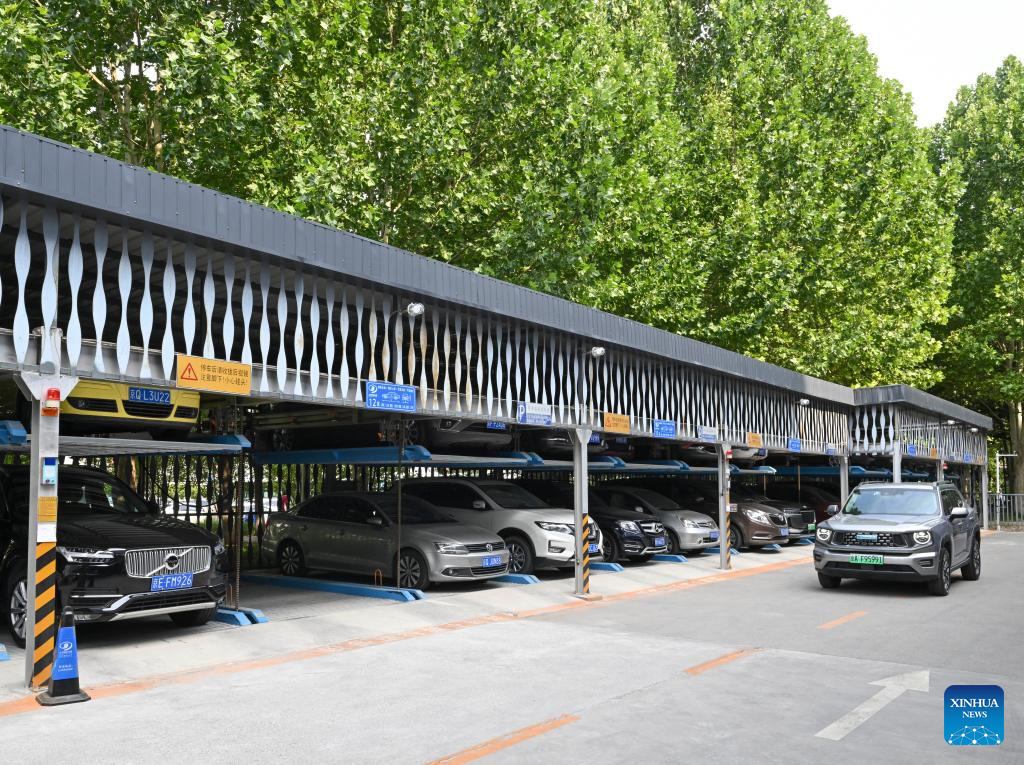
This photo taken on July 11, 2023 shows a two-story parking lot for hutong residents in Neiwubujie in Beijing, capital of China. (Xinhua/Hao Jianwei)
BEIJING, July 12 (Xinhua) -- More hutong residents in downtown Beijing are enjoying backstreet life without the din of car horns.
Wang Shunying, 65, is one of them. The hutong he has lived in for decades has become a "zero parking" alley.
"There used to be so many cars parked in this cramped hutong, and finding a parking space was a daunting task for me," said Wang, whose parked car had been hit twice by the passing vehicles in the 7-meter-wide alley.
After a year-long upgrade by the local authority in this hutong named Neiwubujie, Wang now parks his cars in a designated parking lot, a 10-minute walk from his home.
"The community management office has renovated the old car-park ground into a multi-story parking garage, accommodating 80 motorized vehicles for the hutong residents.
In the 700-meter-long hutong in the Chaoyangmen subdistrict area in Dongcheng district, there are 1,700 residents, a public middle school, and several historical courtyards. The parking issue had been a headache for people living there.
"The large number of parked vehicles often caused congestion in the narrow path, and many were afraid that fire vehicles are not able to drive through if there is a fire," said Li Lei, a sub-district staff.
In 2022, the local authority launched a parking ban to change the situation. However, the hutong residents did not show a smiling face to the plan at first. They preferred to park near their homes instead of in paid parking lots outside the hutong areas.
It was not an easy task to negotiate, Li said. It took almost a year to persuade residents to drive their cars outside the hutong.
Wang said hutong residents like him need to pay 450 yuan (63 U.S. dollars) per month for the parking lot. But for the retired man, despite the new spending, travel becomes safer.
"We no longer worry about spending hours looking for a parking space or worry of being hit by a car," Wang added.
Cai Yongjun, a 76-year-old man who lives in the hutong, said after the parking problem was solved, the hutong became prettier. "We have more space to rest and enjoy the greenery nearby, which is pleasant."
So far, Dongcheng district has over 40 hutongs that have banned parking and have cooperated with nearby public facilities to provide space for residents to park.
Hutong communities began to take shape in Beijing in the 13th century. The centuries-old architectural legacies faced the threat of disappearance when the urban development of the ancient capital accelerated amid the roar of bulldozers in the 1990s. Thanks to calls for cultural heritage protection efforts, hundreds of hutongs were saved.
However, the problem facing hutongs today is how to become quieter, cleaner, and better in the bustling megacity.
The "zero parking" policy is Beijing's latest move to clean up the city center to be a cozy place for people to live. In a detailed plan for the core area of Beijing for the 2018-2035 period, the central government has stated that the city should protect its culture and history while maintaining convenience for the people.
"It (zero parking) is just a start. We believe we will have a better hutong life," said Wang. ■



